Papers by Dr. G. YOGANANDHAM

Degres Journal ISSN NO:0376-8163, 2024
The integration of Aadhaar and PAN card systems in Tamil Nadu marks a
significant milestone in th... more The integration of Aadhaar and PAN card systems in Tamil Nadu marks a
significant milestone in the digital transformation of welfare services. This study
explores the economic implications, fraud risks, and privacy challenges associated
with this integration, focusing on its impact on welfare delivery, citizen empowerment,
and the broader socio-economic landscape. By linking Aadhaar and PAN, the
government aims to streamline welfare disbursement, reduce administrative costs, and
eliminate duplicate beneficiaries. This shift has facilitated targeted subsidies,
enhanced financial inclusion, and improved access to welfare schemes, particularly
for rural and marginalized populations. However, the digital transition also exposes
critical vulnerabilities.The reliance on digital infrastructure heightens fraud risks like
identity theft and phishing, eroding trust in systems and increasing the economic
burden of fraud detection. Centralized data from Aadhaar-PAN integration ensures
efficiency but raises privacy and surveillance concerns.
The absence of robust data protection legislation exacerbates the threat of
misuse, impacting citizens' willingness to engage with digital systems. This paper
highlights the need for balanced policymaking to maximize the economic benefits of
digital transformation while mitigating risks. Recommendations include strengthening
cybersecurity measures, implementing comprehensive data protection laws, and
enhancing public awareness of digital fraud. Addressing these challenges can foster
trust in digital systems, ensuring that technological advancements in welfare delivery
contribute to inclusive growth and economic resilience in Tamil Nadu. This research
paper addresses pressing and highly significant issues within today's rapidly evolving
and interconnected world, highlighting its strong relevance to the current global
landscape.
Science, Technology and Development Volume XIII Issue XII DECEMBER 2024 ISSN : 0950-0707, 2024
The rapid growth of digital financial services has brought numerous benefits, still it has also g... more The rapid growth of digital financial services has brought numerous benefits, still it has also given rise to new and sophisticated forms of fraud, posing significant threats to privacy, security, and consumer trust. This paper explores emerging trends in digital fraud, focusing on three major areas, malicious applications, exploitative loan financing, and payment manipulation. Malicious applications, often disguised as

GIS SCIENCE JOURNAL, 2024
India, as one of the world's fastest-growing economies, faces a unique set of challenges and oppo... more India, as one of the world's fastest-growing economies, faces a unique set of challenges and opportunities in its pursuit of sustainable development. Public health, education, gender equality, financial inclusion, and economic empowerment are central pillars of India's development agenda, and the government has undertaken a variety of initiatives to transform the socioeconomic landscape. This paper examines the impact of key government policies and programs aimed at improving these areas, highlighting their contribution to long-term sustainable development. Public health initiatives like the National Health Mission and Ayushman Bharat have improved healthcare access, reduced mortality rates, and enhanced health infrastructure. Education reforms like the Right to Education Act and National Skill Development Mission have increased enrollment and vocational training. Financial inclusion has been accelerated by the Pradhan Mantri Jan Dhan Yojana, which has helped millions of previously unbanked individuals access formal financial services, thus reducing poverty and promoting economic participation. Furthermore, initiatives such as Start-Up India and Skill India have focused on economic empowerment, fostering entrepreneurship, job creation, and economic independence, particularly for youth and marginalized communities. India's government initiatives in health, education, gender equality, financial inclusion, and empowerment are key drivers of sustainable development. These programs help reduce disparities and create opportunities for economic growth and social inclusion. Continued refinement and expansion of these efforts are crucial for achieving the United Nations' Sustainable Development Goals and fostering an inclusive, equitable future for all. This research paper explores key issues that are both pressing and highly important in today's rapidly evolving and interconnected world, highlighting its strong relevance to the current global landscape.
Degres Journal, 2024
India's agricultural sector, a cornerstone of its economy, faces significant challenges related t... more India's agricultural sector, a cornerstone of its economy, faces significant challenges related to sustainability, market access, and economic growth. With over half of the population dependent on agriculture, transforming this sector is crucial for fostering inclusive growth and improving livelihoods. This paper explores
Mukt Shabd Journal, 2024
A gig economy is a free market system where temporary jobs are common, with gigs traditionally us... more A gig economy is a free market system where temporary jobs are common, with gigs traditionally used by musicians for performance engagements. The rapid digital shift and the rise of the gig economy have transformed labor markets globally, presenting new opportunities and challenges for workers. This assessment examines
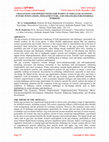
JuniKhyat, 2024
The gig economy in India presents a landscape of both opportunities and challenges, particularly ... more The gig economy in India presents a landscape of both opportunities and challenges, particularly for
women workers. As the sector grows, it offers flexible employment options that can empower
women economically and socially. However, it also exposes them to vulnerabilities due to the lack of
structured labor protections and consistent income. Women in the gig economy face income
instability and lack of legal protections, often falling outside traditional labor laws, resulting in
fluctuating incomes and inadequate workplace protections. Women in ride-sharing and delivery
sectors face safety risks due to inadequate support systems and workplace regulations, while the
digital divide disproportionately affects rural and underserved areas. Flexible work arrangements
offer women economic empowerment by enabling them to balance work and family responsibilities,
potentially increasing their workforce participation.
The gig economy empowers women through micro-entrepreneurship and self-employment,
promoting innovation and business ownership. It also facilitates skill development, enhancing
employability and career prospects. Future innovations include digital platforms for job matching,
safety, and payment systems, and comprehensive policies for gig workers to ensure a secure and
equitable working environment. Investments in technology infrastructure, especially in rural areas,
can bridge the digital divide, increase gig opportunities, prepare women for gig roles, and foster a
supportive work environment. In short, while the gig economy presents substantial potential for
women's empowerment in India, it also necessitates targeted strategies and innovations to address
existing challenges and leverage opportunities for inclusive growth.The article explores the impact of
digital technology adoption and the expansion of the gig economy on women's participation in the
workforce. It addresses current economic challenges in developing nations such as India,
highlighting its social relevance and timeliness.
Science, Technology and Development, 2024
The gig economy in Tamil Nadu has undergone significant transformation over the past decade, driv... more The gig economy in Tamil Nadu has undergone significant transformation over the past decade, driven by technological advances, the rise of artificial intelligence (AI), and global economic influences. This study examines the evolution of the gig economy in the region, highlighting how innovations in technology and AI
GIS SCIENCE JOURNAL, 2024
The gig economy in India has rapidly expanded, transforming the country's labor landscape. This g... more The gig economy in India has rapidly expanded, transforming the country's labor landscape. This growth is driven by a confluence of technological advancements, a burgeoning start-up ecosystem, and the increasing digital penetration across urban and rural areas. This paper explores the rise of gig economy platforms, which connect

Degres Journal, 2024
The COVID-19 pandemic brought unprecedented challenges, including a surge in fraudulent activitie... more The COVID-19 pandemic brought unprecedented challenges, including a surge in fraudulent activities such as fake vaccination calls and unauthorized COVID testing sites, which significantly impacted the economy of Tamil Nadu. These scams exploited public fear and urgency, undermining trust in healthcare systems and diverting critical resources from legitimate pandemic response efforts. This abstract explores the multifaceted economic consequences of these fraudulent practices, focusing on direct financial losses, healthcare system strain, and broader societal impacts. Fraudulent vaccination calls and fake testing sites led to financial losses for individuals coerced into paying for non-existent vaccines or tests, with significant implications for low-income households. These schemes drained personal savings and heightened economic insecurity among vulnerable populations already struggling with pandemic-induced job losses. On a larger scale, the diversion of funds toward fraudulent operators disrupted legitimate healthcare service providers, creating inefficiencies in resource allocation and slowing down vaccination and testing drives critical for pandemic control. Fraudulent practices in public health led to a loss of trust, increased vaccine hesitancy, and delayed business reopening. This exacerbated the pandemic's economic impacts, causing unemployment and increased healthcare costs. The burden was further amplified by regulatory crackdowns, surveillance, and legal actions against fraudsters. In short, fraudulent COVID-19 schemes during the pandemic in Tamil Nadu not only caused immediate financial harm to individuals but also hindered the state's economic recovery and pandemic management efforts. Addressing these challenges requires a multifaceted approach, including robust public awareness, stringent regulatory frameworks, and leveraging technology to ensure the authenticity of healthcare services. Understanding these impacts is critical for designing policies to prevent similar crises in the future, protecting both public health and economic stability. This research paper's theme is highly relevant in today's increasingly interconnected and fast-paced world, addressing crucial socioeconomic and political issues that are both timely and of significant importance in the current global landscape.
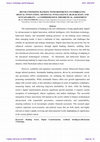
Science, Technology and Development Volume XIII Issue XI NOVEMBER 2024 ISSN : 0950-0707, 2024
The transformation of banking in the new millennium is being significantly shaped
by advancements... more The transformation of banking in the new millennium is being significantly shaped
by advancements in digital innovation, artificial intelligence (AI), blockchain technology,
behavioral finance, and sustainable banking practices. As the banking sector embraces
these emerging trends, it faces a multitude of risks, opportunities, and challenges that
redefine its operational and strategic landscapes. Digital innovation has paved the way for
enhanced customer experiences through digital banking channels, enabling faster
transactions, personalized services, and greater financial inclusion. However, this shift has
also introduced cybersecurity risks, data privacy concerns, and the challenge of adapting to
the fast-paced technological evolution. AI, blockchain, and behavioral finance are
revolutionizing banking by improving efficiency and customer service. AI processes large
datasets, while blockchain reduces fraud and enhances trust.
However, scalability and regulatory uncertainties remain. Behavioral finance helps
design tailored products. Sustainable banking practices, driven by environmental, social,
and governance (ESG) considerations, are reshaping the financial industry's role in
promoting sustainability. While sustainable finance offers new growth opportunities and
aligns with societal values, it also introduces challenges in terms of regulatory compliance,
measuring impact, and achieving long-term profitability. In short, while the banking
sector’s digital transformation presents significant growth potential, it requires careful
navigation of technological, ethical, regulatory, and market challenges. The successful
integration of these innovations will depend on the sector's ability to balance technological
advancement with responsible governance, customer-centricity, and sustainability,
ensuring resilience in an increasingly complex financial ecosystem. This research paper
explores important socio-economic and political issues that are both timely and highly
relevant in today's rapidly evolving and interconnected world, highlighting its significance
in the current global context.

GIS SCIENCE JOURNAL, 2024
Atmanirbhar Bharat, or self-reliant India, envisions a nation capable of sustainable
development ... more Atmanirbhar Bharat, or self-reliant India, envisions a nation capable of sustainable
development and global competitiveness. Central to this vision is the role of education and skill
development in empowering India’s youth and workforce. A robust education system integrated
with practical skill-building is critical to unlocking the demographic dividend and fostering
economic growth. The National Education Policy (NEP) 2020 highlights this alignment by
emphasizing vocational training, multidisciplinary education, and the integration of technology
into learning. Upskilling initiatives such as the Skill India Mission and Digital India enhance
employability and enable individuals to adapt to the evolving demands of the global market.
Furthermore, strengthening industry-academia linkages through internships and apprenticeships
ensures that learning is aligned with real-world applications.
A skilled workforce drives innovation, attracts investments, and positions India as a
global manufacturing and services hub. Initiatives like Make in India and Startup India thrive on
this foundation of talent and expertise, enabling India to compete globally while fostering
sustainable development domestically. In short, education and skill development are
cornerstones of Atmanirbhar Bharat. By investing in these areas, India can not only achieve self-
reliance but also emerge as a leader in sustainable and inclusive global development. This
research paper delves into critical socio-economic and political issues that are both timely and
highly significant in today's fast-paced and interconnected world, making it exceptionally
relevant to the current global context.
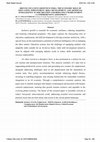
Mukt Shabd Journal Volume XIII, Issue XI, NOVEMBER/2024 ISSN NO : 2347-3150, 2024
Inclusive growth is essential for economic resilience, reducing inequalities,
and fostering wides... more Inclusive growth is essential for economic resilience, reducing inequalities,
and fostering widespread prosperity. This paper explores the intersecting roles of
education, employment, and skill development in driving economic inclusivity, with a
special focus on the transformative potential of artificial intelligence (AI) in reshaping
the labor market. Education systems face the challenge of equipping students with
adaptable skills suitable for an AI-driven future, while skill development initiatives
must be aligned with emerging industry needs to reduce skills mismatches and
increase employability.
AI, often viewed as a disruptive force, is also positioned as a catalyst for new
job creation and unemployment solutions. This analysis considers AI’s dual role in
augmenting productivity across sectors and generating new avenues for employment,
alongside addressing challenges such as job displacement and the automation of
routine tasks. Key policy recommendations include enhancing digital literacy,
investing in reskilling programs, and creating frameworks for sustainable workforce
integration in an AI economy. Through a comprehensive economic analysis, this
paper aims to identify strategies that balance technological advancement with human-
centered employment, ensuring that growth remains inclusive and equitable in the
evolving global economy. The theme of this research paper is incredibly relevant in
today's fast-paced, interconnected world, addressing essential socio-economic and
political issues that are both timely and crucial in the current global landscape.
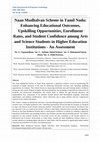
Tuijin Jishu/Journal of Propulsion Technology, 2024
The Naan Mudhalvan Scheme in Tamil Nadu represents a significant initiative aimed at transforming... more The Naan Mudhalvan Scheme in Tamil Nadu represents a significant initiative aimed at transforming the landscape of higher education in the state by enhancing educational outcomes and expanding upskilling opportunities for students. This scheme focuses on improving enrollment rates and boosting student confidence among arts and science students in higher education institutions. By providing a comprehensive framework for academic and professional development, the scheme seeks to address the gap between education and employability. Key components of the initiative include tailored skill development programs, mentorship opportunities, and industry collaborations, which collectively aim to equip students with the competencies required for the modern job market. The scheme's impact on educational outcomes is measured through improved academic performance, increased retention rates, and higher graduation rates. Upskilling opportunities offered through the program are designed to align with industry needs, thereby enhancing students' employability and career prospects. Enrollment rates are expected to rise as a result of the scheme's efforts to make higher education more accessible and appealing. Moreover, the Naan Mudhalvan Scheme aims to instill greater confidence in students by fostering a supportive educational environment and providing resources that facilitate personal and professional growth. This holistic approach not only prepares students for successful careers but also contributes to the broader objective of educational and economic advancement in Tamil Nadu. Overall, the Naan Mudhalvan Scheme stands as a pivotal endeavor in reshaping higher education in Tamil Nadu, with the potential to significantly impact student outcomes and contribute to the state's development goals.

Degres Journal, 2024
The rise of credit card fraud has emerged as a significant threat to global
financial systems, af... more The rise of credit card fraud has emerged as a significant threat to global
financial systems, affecting consumers, financial institutions, and the broader
economy. This paper critically analyzes the economic impact of various types of
credit card fraud, including activation fraud, limit upgrade manipulation, cashback
scams, discount fraud, and overdraft risks. Each type of fraud represents a unique
challenge, with activation fraud and limit upgrades targeting new and inexperienced
cardholders, leading to unauthorized transactions and financial losses for both
consumers and banks. Cashback scams and discount fraud, on the other hand, exploit
promotional schemes, resulting in revenue losses for businesses and higher costs for
consumers due to inflationary pressures as merchants offset their losses by increasing
prices. Furthermore, the analysis highlights overdraft risks as a major concern for both
consumers and lenders. Overdraft fraud, when credit is extended beyond the account
holder's limit without proper authorization or repayment, imposes significant financial
risks on banks, leading to increased interest rates, higher penalties, and stricter
lending policies. These fraudulent activities not only erode consumer trust in the
financial system but also elevate operational costs for banks, necessitating
investments in advanced security measures and fraud detection technologies.
The paper also examines the macroeconomic implications, particularly the
impact on consumer spending patterns, economic confidence, and credit market
stability. Fraudulent activities in the credit card sector lead to increased risk premiums,
raising borrowing costs and potentially stifling economic growth. Additionally, the
burden of fraud-related losses on financial institutions may result in reduced access to
credit, especially in emerging markets where regulatory frameworks are less robust.
In short, while credit card fraud poses a multifaceted challenge to the financial
ecosystem, strategic interventions such as regulatory oversight, enhanced consumer
awareness, and cutting-edge technological innovations can mitigate its economic
impact. Through an integrated approach, the financial sector can better protect
consumers, preserve trust, and ensure the stability of credit markets.This research
paper's theme holds significant relevance in today's fast-paced, interconnected world,
addressing crucial socio-economic and political challenges that are both timely and
essential in the current global landscape.

GIS SCIENCE JOURNAL VOLUME 11, ISSUE 10, 2024 ISSN NO : 1869-9391, 2024
India's agriculture sector, supporting nearly 60% of the population, faces the
pressing need to e... more India's agriculture sector, supporting nearly 60% of the population, faces the
pressing need to enhance productivity sustainably amid climate change, resource
limitations, and rural livelihood challenges. This study explores an integrative
approach that combines traditional agricultural practices with modern technologies,
aiming to achieve long-term environmental and socioeconomic benefits. Traditional
practices, including crop rotation, intercropping, organic fertilizers, and water
conservation methods, provide ecological resilience and cost-effectiveness, benefiting
small-scale farmers who form the backbone of Indian agriculture. These techniques
enhance soil health, biodiversity, and climate resilience, addressing environmental
sustainability challenges. On the other hand, modern practices such as precision
agriculture, Genetically Modified (GM) crops, digital tools, and efficient irrigation
systems offer advanced productivity and resource management, crucial for meeting
India's food security needs. Digital technologies like mobile apps and drones improve
decision-making and farm management, allowing farmers to monitor crop health,
optimize inputs, and reduce environmental impacts. Integrating these innovations with
traditional knowledge promotes productivity and minimizes resource exploitation,
creating a balanced, sustainable agricultural model.
The study identifies key socioeconomic benefits, including reduced input costs,
improved yield quality, and enhanced livelihoods, particularly for marginalized
farming communities. It also highlights policy frameworks and community
engagement as essential for successful integration, as well as the role of public-private
partnerships in facilitating access to technology and knowledge dissemination. This
integrative approach offers a blueprint for sustainable agriculture in India, aligning
with the Sustainable Development Goals (SDGs) and promoting a resilient, equitable,
and environmentally responsible agricultural sector. This research paper’s theme is
highly pertinent in today’s rapidly evolving, interconnected world, tackling vital
socio-economic and political challenges that are both relevant and necessary in the
present global context.
Mukt Shabd Journal Volume XIII, Issue X, OCTOBER/2024 ISSN NO : 2347-3150, 2024
The rapid proliferation of digital transactions and e-commerce has led to a significant rise in c... more The rapid proliferation of digital transactions and e-commerce has led to a significant rise in credit card fraud, posing a serious threat to consumers and financial institutions. This paper explores the importance of robust regulatory frameworks and heightened consumer awareness in mitigating financial risks associated with credit card fraud. Credit card fraud not only results in direct financial losses but also
GIS SCIENCE JOURNAL, 2024
In the rapidly evolving digital economy, fraudulent activities related to app-based banking, fake... more In the rapidly evolving digital economy, fraudulent activities related to app-based banking, fake loans, bet scams, and the involvement of aggressive recovery agents have become critical concerns. This paper provides an economic assessment of these cyber frauds, focusing on their impact on consumers, financial institutions, and the broader economy. Fraudulent app
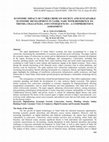
International Journal of Early Childhood Special Education (INT-JECSE) DOI:10.48047/intjecse/v16i4.88 ISSN: 1308-5581 Vol 16, Issue 04 2024, 2024
The rapid digitalization of Tamil Nadu's economy has been accompanied by a surge in cybercrime, t... more The rapid digitalization of Tamil Nadu's economy has been accompanied by a surge in cybercrime, threatening the sustainability of economic growth and social well-being. This paper explores the economic impact of cybercrime on society and its implications for sustainable economic development in the region, focusing on key trends, challenges, and consequences. Cybercrimes, including data breaches, phishing attacks, and identity theft, online banking fraud, and social media impersonation, are escalating in Tamil Nadu as more citizens and businesses engage in the digital economy. These crimes disrupt the smooth functioning of the financial sector, reduce consumer trust in online platforms, and increase costs for businesses. The study analyzes how cybercrime undermines economic activities by increasing risk perception, thereby affecting investments in e-commerce, fintech, and digital banking. The paper highlights the challenges of insufficient cybersecurity infrastructure, public awareness, and legal frameworks in Tamil Nadu, which hinder growth prospects and threaten a sustainable, technology-driven economy. The consequences of cybercrime extend beyond financial losses. They affect employment, reduce consumer spending, and hinder the development of a safe, inclusive digital ecosystem. This analysis further examines how cybercrime contributes to economic inequality by disproportionately affecting marginalized communities, such as small businesses and rural populations, who often lack access to robust cybersecurity measures. The paper suggests enhancing cybersecurity policies, raising awareness, and promoting technological advancements to ensure long-term economic sustainability in Tamil Nadu. Collaboration between public and private sectors is crucial for enhancing digital literacy and cyber defense mechanisms.The theme of the research paper is highly relevant in today's interconnected, everevolving world, addressing crucial socioeconomic and political issues that are both timely and essential for the present context.
Science, Technology and Development Volume XIII Issue X OCTOBER 2024 ISSN : 0950-0707, 2024
The COVID-19 pandemic has accelerated the digitization of healthcare systems, leading to a signif... more The COVID-19 pandemic has accelerated the digitization of healthcare systems, leading to a significant increase in online healthcare payments and a corresponding rise in cybercrime, particularly social engineering threats. This paper explores the economic implications of cybercrime in the healthcare sector during the pandemic, emphasizing the need for effective
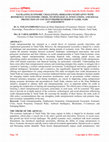
JuniKhyat (जूनीƥात) ISSN: 2278-4632 (UGC Care Group I Listed Journal) Vol-14, Issue-10, No.03, October: 2024, 2024
Youth entrepreneurship has emerged as a crucial driver of economic growth, innovation, and
employ... more Youth entrepreneurship has emerged as a crucial driver of economic growth, innovation, and
employment generation in Tamil Nadu. However, the entrepreneurial ecosystem is shaped by a variety
of challenges and uncertainties, particularly during periods of economic crisis. This abstract aims to
explore the dynamic interplay between economic challenges, technological innovations, and social
protection mechanisms and their influence on youth entrepreneurship in Tamil Nadu.Economic crises
significantly impact entrepreneurship, increasing financial risks, reducing capital access, and
intensifying market uncertainties due to recessions or global financial instability.Youth entrepreneurs,
often with limited experience and financial backing, are particularly vulnerable. Understanding how
these crises affect their entrepreneurial ventures and examining strategies they employ to mitigate risk is
essential to fostering a resilient entrepreneurial environment. Technological innovation, particularly in
artificial intelligence, blockchain, and e-commerce, has significantly impacted the digital revolution,
offering new opportunities for young entrepreneurs.This study investigates how youth entrepreneurs in
Tamil Nadu are using technology to overcome traditional barriers and create disruptive business models
for emerging market needs.cSocial protection mechanisms, such as government welfare schemes,
financial assistance programs, and startup incubators, are crucial in supporting young entrepreneurs
during economic downturns and uncertainties.In Tamil Nadu, schemes such as the Naan Mudhalvan
initiative, designed to enhance skills and entrepreneurship, serve as important pillars for youth in
navigating the complexities of starting and sustaining businesses. The effectiveness of these programs in
fostering a robust entrepreneurial ecosystem, particularly in rural areas, will be examined. This paper
aims to provide an in-depth analysis of the economic, technological, and social dimensions influencing
youth entrepreneurship in Tamil Nadu. By assessing the interplay of these factors, the study seeks to
offer policy recommendations that can strengthen youth entrepreneurial resilience and promote long-
term economic sustainability in the area.

Uploads
Papers by Dr. G. YOGANANDHAM
significant milestone in the digital transformation of welfare services. This study
explores the economic implications, fraud risks, and privacy challenges associated
with this integration, focusing on its impact on welfare delivery, citizen empowerment,
and the broader socio-economic landscape. By linking Aadhaar and PAN, the
government aims to streamline welfare disbursement, reduce administrative costs, and
eliminate duplicate beneficiaries. This shift has facilitated targeted subsidies,
enhanced financial inclusion, and improved access to welfare schemes, particularly
for rural and marginalized populations. However, the digital transition also exposes
critical vulnerabilities.The reliance on digital infrastructure heightens fraud risks like
identity theft and phishing, eroding trust in systems and increasing the economic
burden of fraud detection. Centralized data from Aadhaar-PAN integration ensures
efficiency but raises privacy and surveillance concerns.
The absence of robust data protection legislation exacerbates the threat of
misuse, impacting citizens' willingness to engage with digital systems. This paper
highlights the need for balanced policymaking to maximize the economic benefits of
digital transformation while mitigating risks. Recommendations include strengthening
cybersecurity measures, implementing comprehensive data protection laws, and
enhancing public awareness of digital fraud. Addressing these challenges can foster
trust in digital systems, ensuring that technological advancements in welfare delivery
contribute to inclusive growth and economic resilience in Tamil Nadu. This research
paper addresses pressing and highly significant issues within today's rapidly evolving
and interconnected world, highlighting its strong relevance to the current global
landscape.
women workers. As the sector grows, it offers flexible employment options that can empower
women economically and socially. However, it also exposes them to vulnerabilities due to the lack of
structured labor protections and consistent income. Women in the gig economy face income
instability and lack of legal protections, often falling outside traditional labor laws, resulting in
fluctuating incomes and inadequate workplace protections. Women in ride-sharing and delivery
sectors face safety risks due to inadequate support systems and workplace regulations, while the
digital divide disproportionately affects rural and underserved areas. Flexible work arrangements
offer women economic empowerment by enabling them to balance work and family responsibilities,
potentially increasing their workforce participation.
The gig economy empowers women through micro-entrepreneurship and self-employment,
promoting innovation and business ownership. It also facilitates skill development, enhancing
employability and career prospects. Future innovations include digital platforms for job matching,
safety, and payment systems, and comprehensive policies for gig workers to ensure a secure and
equitable working environment. Investments in technology infrastructure, especially in rural areas,
can bridge the digital divide, increase gig opportunities, prepare women for gig roles, and foster a
supportive work environment. In short, while the gig economy presents substantial potential for
women's empowerment in India, it also necessitates targeted strategies and innovations to address
existing challenges and leverage opportunities for inclusive growth.The article explores the impact of
digital technology adoption and the expansion of the gig economy on women's participation in the
workforce. It addresses current economic challenges in developing nations such as India,
highlighting its social relevance and timeliness.
by advancements in digital innovation, artificial intelligence (AI), blockchain technology,
behavioral finance, and sustainable banking practices. As the banking sector embraces
these emerging trends, it faces a multitude of risks, opportunities, and challenges that
redefine its operational and strategic landscapes. Digital innovation has paved the way for
enhanced customer experiences through digital banking channels, enabling faster
transactions, personalized services, and greater financial inclusion. However, this shift has
also introduced cybersecurity risks, data privacy concerns, and the challenge of adapting to
the fast-paced technological evolution. AI, blockchain, and behavioral finance are
revolutionizing banking by improving efficiency and customer service. AI processes large
datasets, while blockchain reduces fraud and enhances trust.
However, scalability and regulatory uncertainties remain. Behavioral finance helps
design tailored products. Sustainable banking practices, driven by environmental, social,
and governance (ESG) considerations, are reshaping the financial industry's role in
promoting sustainability. While sustainable finance offers new growth opportunities and
aligns with societal values, it also introduces challenges in terms of regulatory compliance,
measuring impact, and achieving long-term profitability. In short, while the banking
sector’s digital transformation presents significant growth potential, it requires careful
navigation of technological, ethical, regulatory, and market challenges. The successful
integration of these innovations will depend on the sector's ability to balance technological
advancement with responsible governance, customer-centricity, and sustainability,
ensuring resilience in an increasingly complex financial ecosystem. This research paper
explores important socio-economic and political issues that are both timely and highly
relevant in today's rapidly evolving and interconnected world, highlighting its significance
in the current global context.
development and global competitiveness. Central to this vision is the role of education and skill
development in empowering India’s youth and workforce. A robust education system integrated
with practical skill-building is critical to unlocking the demographic dividend and fostering
economic growth. The National Education Policy (NEP) 2020 highlights this alignment by
emphasizing vocational training, multidisciplinary education, and the integration of technology
into learning. Upskilling initiatives such as the Skill India Mission and Digital India enhance
employability and enable individuals to adapt to the evolving demands of the global market.
Furthermore, strengthening industry-academia linkages through internships and apprenticeships
ensures that learning is aligned with real-world applications.
A skilled workforce drives innovation, attracts investments, and positions India as a
global manufacturing and services hub. Initiatives like Make in India and Startup India thrive on
this foundation of talent and expertise, enabling India to compete globally while fostering
sustainable development domestically. In short, education and skill development are
cornerstones of Atmanirbhar Bharat. By investing in these areas, India can not only achieve self-
reliance but also emerge as a leader in sustainable and inclusive global development. This
research paper delves into critical socio-economic and political issues that are both timely and
highly significant in today's fast-paced and interconnected world, making it exceptionally
relevant to the current global context.
and fostering widespread prosperity. This paper explores the intersecting roles of
education, employment, and skill development in driving economic inclusivity, with a
special focus on the transformative potential of artificial intelligence (AI) in reshaping
the labor market. Education systems face the challenge of equipping students with
adaptable skills suitable for an AI-driven future, while skill development initiatives
must be aligned with emerging industry needs to reduce skills mismatches and
increase employability.
AI, often viewed as a disruptive force, is also positioned as a catalyst for new
job creation and unemployment solutions. This analysis considers AI’s dual role in
augmenting productivity across sectors and generating new avenues for employment,
alongside addressing challenges such as job displacement and the automation of
routine tasks. Key policy recommendations include enhancing digital literacy,
investing in reskilling programs, and creating frameworks for sustainable workforce
integration in an AI economy. Through a comprehensive economic analysis, this
paper aims to identify strategies that balance technological advancement with human-
centered employment, ensuring that growth remains inclusive and equitable in the
evolving global economy. The theme of this research paper is incredibly relevant in
today's fast-paced, interconnected world, addressing essential socio-economic and
political issues that are both timely and crucial in the current global landscape.
financial systems, affecting consumers, financial institutions, and the broader
economy. This paper critically analyzes the economic impact of various types of
credit card fraud, including activation fraud, limit upgrade manipulation, cashback
scams, discount fraud, and overdraft risks. Each type of fraud represents a unique
challenge, with activation fraud and limit upgrades targeting new and inexperienced
cardholders, leading to unauthorized transactions and financial losses for both
consumers and banks. Cashback scams and discount fraud, on the other hand, exploit
promotional schemes, resulting in revenue losses for businesses and higher costs for
consumers due to inflationary pressures as merchants offset their losses by increasing
prices. Furthermore, the analysis highlights overdraft risks as a major concern for both
consumers and lenders. Overdraft fraud, when credit is extended beyond the account
holder's limit without proper authorization or repayment, imposes significant financial
risks on banks, leading to increased interest rates, higher penalties, and stricter
lending policies. These fraudulent activities not only erode consumer trust in the
financial system but also elevate operational costs for banks, necessitating
investments in advanced security measures and fraud detection technologies.
The paper also examines the macroeconomic implications, particularly the
impact on consumer spending patterns, economic confidence, and credit market
stability. Fraudulent activities in the credit card sector lead to increased risk premiums,
raising borrowing costs and potentially stifling economic growth. Additionally, the
burden of fraud-related losses on financial institutions may result in reduced access to
credit, especially in emerging markets where regulatory frameworks are less robust.
In short, while credit card fraud poses a multifaceted challenge to the financial
ecosystem, strategic interventions such as regulatory oversight, enhanced consumer
awareness, and cutting-edge technological innovations can mitigate its economic
impact. Through an integrated approach, the financial sector can better protect
consumers, preserve trust, and ensure the stability of credit markets.This research
paper's theme holds significant relevance in today's fast-paced, interconnected world,
addressing crucial socio-economic and political challenges that are both timely and
essential in the current global landscape.
pressing need to enhance productivity sustainably amid climate change, resource
limitations, and rural livelihood challenges. This study explores an integrative
approach that combines traditional agricultural practices with modern technologies,
aiming to achieve long-term environmental and socioeconomic benefits. Traditional
practices, including crop rotation, intercropping, organic fertilizers, and water
conservation methods, provide ecological resilience and cost-effectiveness, benefiting
small-scale farmers who form the backbone of Indian agriculture. These techniques
enhance soil health, biodiversity, and climate resilience, addressing environmental
sustainability challenges. On the other hand, modern practices such as precision
agriculture, Genetically Modified (GM) crops, digital tools, and efficient irrigation
systems offer advanced productivity and resource management, crucial for meeting
India's food security needs. Digital technologies like mobile apps and drones improve
decision-making and farm management, allowing farmers to monitor crop health,
optimize inputs, and reduce environmental impacts. Integrating these innovations with
traditional knowledge promotes productivity and minimizes resource exploitation,
creating a balanced, sustainable agricultural model.
The study identifies key socioeconomic benefits, including reduced input costs,
improved yield quality, and enhanced livelihoods, particularly for marginalized
farming communities. It also highlights policy frameworks and community
engagement as essential for successful integration, as well as the role of public-private
partnerships in facilitating access to technology and knowledge dissemination. This
integrative approach offers a blueprint for sustainable agriculture in India, aligning
with the Sustainable Development Goals (SDGs) and promoting a resilient, equitable,
and environmentally responsible agricultural sector. This research paper’s theme is
highly pertinent in today’s rapidly evolving, interconnected world, tackling vital
socio-economic and political challenges that are both relevant and necessary in the
present global context.
employment generation in Tamil Nadu. However, the entrepreneurial ecosystem is shaped by a variety
of challenges and uncertainties, particularly during periods of economic crisis. This abstract aims to
explore the dynamic interplay between economic challenges, technological innovations, and social
protection mechanisms and their influence on youth entrepreneurship in Tamil Nadu.Economic crises
significantly impact entrepreneurship, increasing financial risks, reducing capital access, and
intensifying market uncertainties due to recessions or global financial instability.Youth entrepreneurs,
often with limited experience and financial backing, are particularly vulnerable. Understanding how
these crises affect their entrepreneurial ventures and examining strategies they employ to mitigate risk is
essential to fostering a resilient entrepreneurial environment. Technological innovation, particularly in
artificial intelligence, blockchain, and e-commerce, has significantly impacted the digital revolution,
offering new opportunities for young entrepreneurs.This study investigates how youth entrepreneurs in
Tamil Nadu are using technology to overcome traditional barriers and create disruptive business models
for emerging market needs.cSocial protection mechanisms, such as government welfare schemes,
financial assistance programs, and startup incubators, are crucial in supporting young entrepreneurs
during economic downturns and uncertainties.In Tamil Nadu, schemes such as the Naan Mudhalvan
initiative, designed to enhance skills and entrepreneurship, serve as important pillars for youth in
navigating the complexities of starting and sustaining businesses. The effectiveness of these programs in
fostering a robust entrepreneurial ecosystem, particularly in rural areas, will be examined. This paper
aims to provide an in-depth analysis of the economic, technological, and social dimensions influencing
youth entrepreneurship in Tamil Nadu. By assessing the interplay of these factors, the study seeks to
offer policy recommendations that can strengthen youth entrepreneurial resilience and promote long-
term economic sustainability in the area.
significant milestone in the digital transformation of welfare services. This study
explores the economic implications, fraud risks, and privacy challenges associated
with this integration, focusing on its impact on welfare delivery, citizen empowerment,
and the broader socio-economic landscape. By linking Aadhaar and PAN, the
government aims to streamline welfare disbursement, reduce administrative costs, and
eliminate duplicate beneficiaries. This shift has facilitated targeted subsidies,
enhanced financial inclusion, and improved access to welfare schemes, particularly
for rural and marginalized populations. However, the digital transition also exposes
critical vulnerabilities.The reliance on digital infrastructure heightens fraud risks like
identity theft and phishing, eroding trust in systems and increasing the economic
burden of fraud detection. Centralized data from Aadhaar-PAN integration ensures
efficiency but raises privacy and surveillance concerns.
The absence of robust data protection legislation exacerbates the threat of
misuse, impacting citizens' willingness to engage with digital systems. This paper
highlights the need for balanced policymaking to maximize the economic benefits of
digital transformation while mitigating risks. Recommendations include strengthening
cybersecurity measures, implementing comprehensive data protection laws, and
enhancing public awareness of digital fraud. Addressing these challenges can foster
trust in digital systems, ensuring that technological advancements in welfare delivery
contribute to inclusive growth and economic resilience in Tamil Nadu. This research
paper addresses pressing and highly significant issues within today's rapidly evolving
and interconnected world, highlighting its strong relevance to the current global
landscape.
women workers. As the sector grows, it offers flexible employment options that can empower
women economically and socially. However, it also exposes them to vulnerabilities due to the lack of
structured labor protections and consistent income. Women in the gig economy face income
instability and lack of legal protections, often falling outside traditional labor laws, resulting in
fluctuating incomes and inadequate workplace protections. Women in ride-sharing and delivery
sectors face safety risks due to inadequate support systems and workplace regulations, while the
digital divide disproportionately affects rural and underserved areas. Flexible work arrangements
offer women economic empowerment by enabling them to balance work and family responsibilities,
potentially increasing their workforce participation.
The gig economy empowers women through micro-entrepreneurship and self-employment,
promoting innovation and business ownership. It also facilitates skill development, enhancing
employability and career prospects. Future innovations include digital platforms for job matching,
safety, and payment systems, and comprehensive policies for gig workers to ensure a secure and
equitable working environment. Investments in technology infrastructure, especially in rural areas,
can bridge the digital divide, increase gig opportunities, prepare women for gig roles, and foster a
supportive work environment. In short, while the gig economy presents substantial potential for
women's empowerment in India, it also necessitates targeted strategies and innovations to address
existing challenges and leverage opportunities for inclusive growth.The article explores the impact of
digital technology adoption and the expansion of the gig economy on women's participation in the
workforce. It addresses current economic challenges in developing nations such as India,
highlighting its social relevance and timeliness.
by advancements in digital innovation, artificial intelligence (AI), blockchain technology,
behavioral finance, and sustainable banking practices. As the banking sector embraces
these emerging trends, it faces a multitude of risks, opportunities, and challenges that
redefine its operational and strategic landscapes. Digital innovation has paved the way for
enhanced customer experiences through digital banking channels, enabling faster
transactions, personalized services, and greater financial inclusion. However, this shift has
also introduced cybersecurity risks, data privacy concerns, and the challenge of adapting to
the fast-paced technological evolution. AI, blockchain, and behavioral finance are
revolutionizing banking by improving efficiency and customer service. AI processes large
datasets, while blockchain reduces fraud and enhances trust.
However, scalability and regulatory uncertainties remain. Behavioral finance helps
design tailored products. Sustainable banking practices, driven by environmental, social,
and governance (ESG) considerations, are reshaping the financial industry's role in
promoting sustainability. While sustainable finance offers new growth opportunities and
aligns with societal values, it also introduces challenges in terms of regulatory compliance,
measuring impact, and achieving long-term profitability. In short, while the banking
sector’s digital transformation presents significant growth potential, it requires careful
navigation of technological, ethical, regulatory, and market challenges. The successful
integration of these innovations will depend on the sector's ability to balance technological
advancement with responsible governance, customer-centricity, and sustainability,
ensuring resilience in an increasingly complex financial ecosystem. This research paper
explores important socio-economic and political issues that are both timely and highly
relevant in today's rapidly evolving and interconnected world, highlighting its significance
in the current global context.
development and global competitiveness. Central to this vision is the role of education and skill
development in empowering India’s youth and workforce. A robust education system integrated
with practical skill-building is critical to unlocking the demographic dividend and fostering
economic growth. The National Education Policy (NEP) 2020 highlights this alignment by
emphasizing vocational training, multidisciplinary education, and the integration of technology
into learning. Upskilling initiatives such as the Skill India Mission and Digital India enhance
employability and enable individuals to adapt to the evolving demands of the global market.
Furthermore, strengthening industry-academia linkages through internships and apprenticeships
ensures that learning is aligned with real-world applications.
A skilled workforce drives innovation, attracts investments, and positions India as a
global manufacturing and services hub. Initiatives like Make in India and Startup India thrive on
this foundation of talent and expertise, enabling India to compete globally while fostering
sustainable development domestically. In short, education and skill development are
cornerstones of Atmanirbhar Bharat. By investing in these areas, India can not only achieve self-
reliance but also emerge as a leader in sustainable and inclusive global development. This
research paper delves into critical socio-economic and political issues that are both timely and
highly significant in today's fast-paced and interconnected world, making it exceptionally
relevant to the current global context.
and fostering widespread prosperity. This paper explores the intersecting roles of
education, employment, and skill development in driving economic inclusivity, with a
special focus on the transformative potential of artificial intelligence (AI) in reshaping
the labor market. Education systems face the challenge of equipping students with
adaptable skills suitable for an AI-driven future, while skill development initiatives
must be aligned with emerging industry needs to reduce skills mismatches and
increase employability.
AI, often viewed as a disruptive force, is also positioned as a catalyst for new
job creation and unemployment solutions. This analysis considers AI’s dual role in
augmenting productivity across sectors and generating new avenues for employment,
alongside addressing challenges such as job displacement and the automation of
routine tasks. Key policy recommendations include enhancing digital literacy,
investing in reskilling programs, and creating frameworks for sustainable workforce
integration in an AI economy. Through a comprehensive economic analysis, this
paper aims to identify strategies that balance technological advancement with human-
centered employment, ensuring that growth remains inclusive and equitable in the
evolving global economy. The theme of this research paper is incredibly relevant in
today's fast-paced, interconnected world, addressing essential socio-economic and
political issues that are both timely and crucial in the current global landscape.
financial systems, affecting consumers, financial institutions, and the broader
economy. This paper critically analyzes the economic impact of various types of
credit card fraud, including activation fraud, limit upgrade manipulation, cashback
scams, discount fraud, and overdraft risks. Each type of fraud represents a unique
challenge, with activation fraud and limit upgrades targeting new and inexperienced
cardholders, leading to unauthorized transactions and financial losses for both
consumers and banks. Cashback scams and discount fraud, on the other hand, exploit
promotional schemes, resulting in revenue losses for businesses and higher costs for
consumers due to inflationary pressures as merchants offset their losses by increasing
prices. Furthermore, the analysis highlights overdraft risks as a major concern for both
consumers and lenders. Overdraft fraud, when credit is extended beyond the account
holder's limit without proper authorization or repayment, imposes significant financial
risks on banks, leading to increased interest rates, higher penalties, and stricter
lending policies. These fraudulent activities not only erode consumer trust in the
financial system but also elevate operational costs for banks, necessitating
investments in advanced security measures and fraud detection technologies.
The paper also examines the macroeconomic implications, particularly the
impact on consumer spending patterns, economic confidence, and credit market
stability. Fraudulent activities in the credit card sector lead to increased risk premiums,
raising borrowing costs and potentially stifling economic growth. Additionally, the
burden of fraud-related losses on financial institutions may result in reduced access to
credit, especially in emerging markets where regulatory frameworks are less robust.
In short, while credit card fraud poses a multifaceted challenge to the financial
ecosystem, strategic interventions such as regulatory oversight, enhanced consumer
awareness, and cutting-edge technological innovations can mitigate its economic
impact. Through an integrated approach, the financial sector can better protect
consumers, preserve trust, and ensure the stability of credit markets.This research
paper's theme holds significant relevance in today's fast-paced, interconnected world,
addressing crucial socio-economic and political challenges that are both timely and
essential in the current global landscape.
pressing need to enhance productivity sustainably amid climate change, resource
limitations, and rural livelihood challenges. This study explores an integrative
approach that combines traditional agricultural practices with modern technologies,
aiming to achieve long-term environmental and socioeconomic benefits. Traditional
practices, including crop rotation, intercropping, organic fertilizers, and water
conservation methods, provide ecological resilience and cost-effectiveness, benefiting
small-scale farmers who form the backbone of Indian agriculture. These techniques
enhance soil health, biodiversity, and climate resilience, addressing environmental
sustainability challenges. On the other hand, modern practices such as precision
agriculture, Genetically Modified (GM) crops, digital tools, and efficient irrigation
systems offer advanced productivity and resource management, crucial for meeting
India's food security needs. Digital technologies like mobile apps and drones improve
decision-making and farm management, allowing farmers to monitor crop health,
optimize inputs, and reduce environmental impacts. Integrating these innovations with
traditional knowledge promotes productivity and minimizes resource exploitation,
creating a balanced, sustainable agricultural model.
The study identifies key socioeconomic benefits, including reduced input costs,
improved yield quality, and enhanced livelihoods, particularly for marginalized
farming communities. It also highlights policy frameworks and community
engagement as essential for successful integration, as well as the role of public-private
partnerships in facilitating access to technology and knowledge dissemination. This
integrative approach offers a blueprint for sustainable agriculture in India, aligning
with the Sustainable Development Goals (SDGs) and promoting a resilient, equitable,
and environmentally responsible agricultural sector. This research paper’s theme is
highly pertinent in today’s rapidly evolving, interconnected world, tackling vital
socio-economic and political challenges that are both relevant and necessary in the
present global context.
employment generation in Tamil Nadu. However, the entrepreneurial ecosystem is shaped by a variety
of challenges and uncertainties, particularly during periods of economic crisis. This abstract aims to
explore the dynamic interplay between economic challenges, technological innovations, and social
protection mechanisms and their influence on youth entrepreneurship in Tamil Nadu.Economic crises
significantly impact entrepreneurship, increasing financial risks, reducing capital access, and
intensifying market uncertainties due to recessions or global financial instability.Youth entrepreneurs,
often with limited experience and financial backing, are particularly vulnerable. Understanding how
these crises affect their entrepreneurial ventures and examining strategies they employ to mitigate risk is
essential to fostering a resilient entrepreneurial environment. Technological innovation, particularly in
artificial intelligence, blockchain, and e-commerce, has significantly impacted the digital revolution,
offering new opportunities for young entrepreneurs.This study investigates how youth entrepreneurs in
Tamil Nadu are using technology to overcome traditional barriers and create disruptive business models
for emerging market needs.cSocial protection mechanisms, such as government welfare schemes,
financial assistance programs, and startup incubators, are crucial in supporting young entrepreneurs
during economic downturns and uncertainties.In Tamil Nadu, schemes such as the Naan Mudhalvan
initiative, designed to enhance skills and entrepreneurship, serve as important pillars for youth in
navigating the complexities of starting and sustaining businesses. The effectiveness of these programs in
fostering a robust entrepreneurial ecosystem, particularly in rural areas, will be examined. This paper
aims to provide an in-depth analysis of the economic, technological, and social dimensions influencing
youth entrepreneurship in Tamil Nadu. By assessing the interplay of these factors, the study seeks to
offer policy recommendations that can strengthen youth entrepreneurial resilience and promote long-
term economic sustainability in the area.